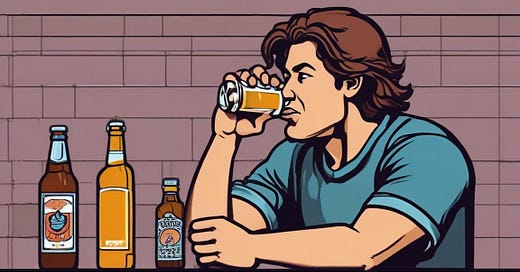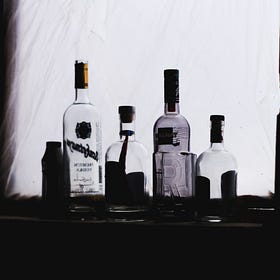Welcome to the AFF Newsletter on Substack.
It’s crazy to think what can lead you to drink. It sometimes doesn’t take much to reach for a beer or your drink of choice. It doesn’t matter how big or small, you drink on any setback, triumph or insignificant thing. You then justify your decision as normality.
I think about all the things in recovery that could’ve led me back to the booze; supporting a loved one through a traumatic time, celebrating success at work or the wind blowing a gale at the exact moment I’m recording a voice note. Setback, triumph or insignificant thing.
Show your support by sharing the AFF Newsletter and earn rewards for your referrals:
It has been ingrained in society that using alcohol as a crutch is something that everyone does. It has been romanticised. It has been normalised. From movies to TV shows, your favourite characters have this habit. And you do. You know no different.
You Might Be Judged and Misunderstood
(Excessive) alcohol use is socially accepted. Normalised. TV, films and social media push and heavily promote it.
This is something you need to change. You need to recognise that life without this habit is achievable. You need to know that this habit, as hard as it may sound or as difficult as it may be in the beginning, is something you can break.

Show up and put in the work
Breaking the habit of using alcohol as a crutch for every situation requires determination and self-awareness. It will force you to take action. You will have to proactively find healthier coping mechanisms. But you can do it.
The main thing you need to acknowledge is that this habit of drinking to cope with both negative and positive emotions - or situations - is unhealthy. It is serving you no good. This self-awareness is the first step toward positive change.
You need to take an honest look at your drinking habits and identify the specific triggers that lead you to drink. For me, these were fear, boredom, loneliness, stress, feeling emotional highs and lows and a lack of self-worth.
Understanding your triggers is crucial for finding healthier alternatives.

Finding alternative coping strategies
You will overcome your habit of using booze as a crutch when you start to develop a healthier range of coping strategies to replace your alcohol use. This will require you to step outside your comfort zone because up until now you’ve chosen the easy - but painful - route of self-medicating with alcohol.
Hooked
The period when you realise you have a problem and not being able to quit is the most painful.
Over the years, men who have successfully broken this habit have told me that exercise, meditation, deep breathing, journaling, engaging in a creative hobby or joining a support group allowed them to achieve success.
This has been my experience too. However, everyone is different. You should try your hardest to find healthy coping strategies that work for you. Don’t be afraid to try different things and incorporate what works best.
Planning ahead BEFORE facing potential triggers has also helped many men I’ve spoken to break this destructive cycle of habitual drinking. Having a list of alternative activities or strategies ready for when the urge to drink arises will save you from going through the emotional rollercoaster of the limbo period.
I also write the Birth of Clarity newsletter, please check it out!
You should establish clear, specific goals related to your drinking habits, share these goals and your progress with a support group (also ask for their support when needed) and avoid isolation by staying connected with others.
You must stay committed to this change and be patient with yourself. Kicking this destructive habit will be worth it in the end, you just need to stay the course.
Realising that I didn’t need to drink alcohol every time something happened in my life was extremely powerful. I’m so grateful that I am now able to experience the ups and downs of life without booze. Some days are hard but I know drinking will make them harder, if not immediately then in the future.
It may take time to build healthier habits and stop drinking on every emotion, but with persistence, you can do it. A life free from habitual drinking is possible. So make it your mission today to stop using alcohol as a crutch because you’re better off without it.
I hope you enjoyed this free edition of the AFF Newsletter on Substack. If something resonated with you in this article or you have any thoughts, questions or suggestions, then please get in touch:
Take care of yourself and your family,
Roscoe | Alcohol Free Fathers
If you’d like to support this newsletter, you can give a one-off donation here or upgrade your subscription below:
Please follow AFF on Instagram, Twitter/X, Gumroad, Telegram and the website.







